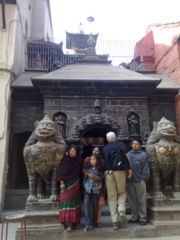Baha: Difference between revisions
Jump to navigation
Jump to search
mNo edit summary |
mNo edit summary |
||
| Line 1: | Line 1: | ||
[[Image:Rob at the Golden Temple.jpg|thumb|180px| | [[Image:Rob at the Golden Temple.jpg|thumb|180px|Western Buddhist fending his way to the Golden Temple in [[Patan]]]] | ||
'''''Baha''''' or ''bahi'', also known by its Sanskrit name ''[[vihara]]'', is the typical Nepali Buddhist monastery. It is a two-storied building, square in plan with open arcades (''dalan'') defining a courtyard. One or more shrines (''chaitya'') are found in the central axis of the courtyard, between the door and the main shrine. | '''''Baha''''' or ''bahi'', also known by its Sanskrit name ''[[vihara]]'', is the typical Nepali Buddhist monastery. It is a two-storied building, square in plan with open arcades (''dalan'') defining a courtyard. One or more shrines (''chaitya'') are found in the central axis of the courtyard, between the door and the main shrine. | ||
[[Category: | [[Category: Monasteries]] | ||
[[Category: Nepal]] | [[Category: Nepal]] | ||
Revision as of 06:45, 5 February 2012

Baha or bahi, also known by its Sanskrit name vihara, is the typical Nepali Buddhist monastery. It is a two-storied building, square in plan with open arcades (dalan) defining a courtyard. One or more shrines (chaitya) are found in the central axis of the courtyard, between the door and the main shrine.